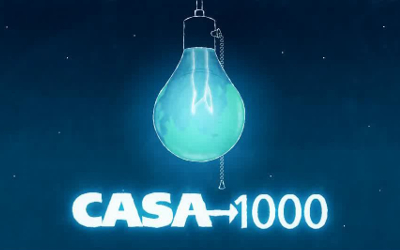AKIPRESS.COM -  The objective of the CASA-1000 project is to create the conditions for sustainable electricity trade between the Central Asian countries of Tajikistan and Kyrgyzstan and the South Asian countries of Afghanistan and Pakistan, according to the World Bank.
The objective of the CASA-1000 project is to create the conditions for sustainable electricity trade between the Central Asian countries of Tajikistan and Kyrgyzstan and the South Asian countries of Afghanistan and Pakistan, according to the World Bank.
The project would be comprised of the following three components and costs in parenthesis are inclusive of contingencies and exclusive of applicable taxes, Environmental and Social costs and Interest During Construction (IDC).
Component A: Construction of High Voltage Transmission Infrastructure ($945 million, of which Bank financing is $518.5 million).
This component would include four subcomponents as follows:
Sub-component A1 – High Voltage Direct Current (HVDC) Transmission Line ($295 million, Bank financing – $216.5 million). Construction of about 750 km of 500 kV HVDC overhead transmission line to interconnect the electricity network of Tajikistan from the Sangtuda converter station, to the Pakistan network at the Peshawar converter station, and the Afghanistan network at the Kabul converter station.
Sub-Component A2 – HVDC Converter Stations ($385 million, Bank financing – $257 million). Engineering design, construction, and commissioning of three HVDC converter stations at Sangtuda (1,300 MW) in Tajikistan, Kabul (300 MW) in Afghanistan and Peshawar (1,300 MW) in Pakistan. The converter stations include specialized converter transformers, breakers, filtering equipment, inverters, controls, ground electrodes, and static and dynamic compensation equipment.
Sub-component A3 – High Voltage AC Transmission (HVAC) Interconnection between Kyrgyzstan and Tajikistan ($200 million, Bank financing – $45 million). This sub-component will finance the construction of about 475 km of kV HVAC overhead transmission line (about 450 km in Kyrgyzstan and 25 km in Tajikistan) to interconnect the network of Kyrgyzstan at Datka s/s, with the Tajikistan network, at the Khudjand s/s.
Sub-component A4 ($65 million, Bank financing – $0 million) – Tajikistan grid reinforcement. This includes the construction of about 115 km of 500 kV line from Regar s/s to Sangtuda s/s and other parts of the network necessary, along with associated substation equipment to ensure transfer of Tajik and Kyrgyz export power to the Sangtuda converter station
Component B: Technical Assistance and Project Implementation Support ($30 million, Bank financing – $8 million).
This component will finance the support for project implementation and technical assistance (TA) required to the four country-specific Project Implementing Agencies as well as for the IGC and IGC Secretariat. The component will be financed by donors through a multi-donor trust fund (MDTF), which is being established specifically for CASA-1000.
Sub-component B1 – HVDC and HVAC Owner’s Engineers ($12 million).
Sub-component B2 – Environment and Social Management Support ($4 million).
Sub-component B3 – Audits and Revenue Management ($4 million).
Sub-component B4 – Project Management Support ($4 million).
Sub-component B5 – IGC Secretariat Support ($4 million).
Sub-component B6 – Project Communications ($2 million).
Sub-component B7 – Capacity Building ($2 million).
Component C: Community Support Programs ($70 million for construction phase, Bank financing – $0 million).
This component will develop and implement CSPs in each of the CASA-1000 countries during the project’s construction period to create a more supportive environment for project implementation by improving livelihoods among the approximately 670 (largely poor) communities living along the CASA-1000 corridor. The CSPs will be predicated on a community driven approach – i.e. community-led decision making for identification and implementation of the selected schemes is a key principle for the programs. The IGC agreed to a mechanism to directly share the benefits of the project with these communities during the operation phase through continued funding of some of these activities.
The preparation and implementation of the CSPs will be phased, with the Afghanistan CSP activities being prepared first. CSPs for the other three countries will be prepared over the course of CY14 in readiness for implementation by mid-2015, to align with the construction phase of the transmission line. Under Component C, the Afghanistan program will be prepared and processed as a free-standing WB operation. The other country programs will be prepared and processed following requirements of different financing arrangements.
The CSPs will be designed independently for each country to allow for tailoring to country-specific circumstances and to enable the incorporation of lessons from similar Community-Driven Development (CDD) projects. The World Bank-managed Afghanistan Reconstruction Trust Fund (ARTF) will finance the Afghanistan portion of the CSP component at an estimated cost of $40 million. The MDTF being set up for CASA-1000 with donor support would be the main vehicle for funding of the planned CSP activities in the other three countries. The estimated cost, to be firmed up after detailed designs are completed, is expected to be $10 million for each country. The scope of each country component may have to be adjusted depending on the level of available funding. Specifically, in Kyrgyzstan and Tajikistan, where the funding is limited, it is possible that commencement of the CSPs during construction may not be completely aligned with the construction phase; however, this should not have a significant impact on the project risks.
The implementation and fiduciary arrangements would be finalized during preparation of the country specific CSP projects. The experiences and lessons learned from the construction phase CSP activities will be taken into account in designing the benefit-sharing mechanisms for the operational period of the project. Detailed designs for the operations phase benefit-sharing schemes will be finalized before project completion to avoid gaps in these community programs, including arrangements for annual planning, implementation, monitoring and evaluation.
